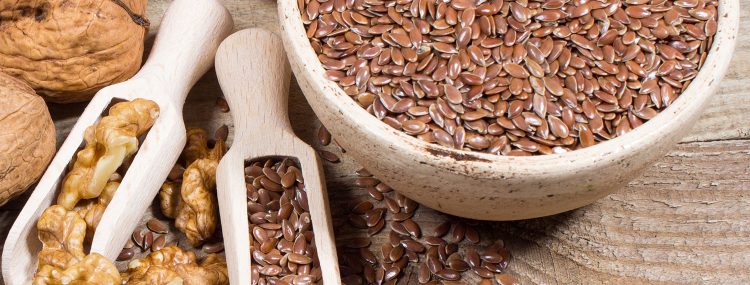
5 Foods Rich in Omega 3 for Vegetarians
Omega 3 is on everybody’s lips…or at least should be! It is one of the most important “essential fats” that our body cannot make on its own and must be supplied in the diet. Omega 3 is an anti-inflammatory food which can repair damaged cells and restore a healthy balance that can prevent diseases like Alzheimer’s, cancers, heart disease and arthritis. Omega 3 also lowers triglycerides, a type of circulating fats that can clog arteries, and improves overall blood circulation.
While fish eaters can get their omega 3 from fatty fish, especially, tuna, salmon, mackerel, vegetarians need not despair. Here’s a list of five good sources of omega 3 for vegans.
Flaxseeds: One of the good vegetarian sources of Omega 3 would be flaxseeds. It is a well known fact that vegetarian sources of nutrients are not as “bioavailable” as their animal counterparts. This means, the body does not absorb all of the omega 3 the vegetarian foods contain. Eating more than recommended amounts of omega 3 foods will ensure more of this nutrient becomes available. One tablespoon or 15 grams of flax seeds provides three times the required daily dose of omega 3. Flaxseed oil is also another option, but this would need to be used raw rather than for cooking.
Walnuts: These tasty brain shaped nuts are packed with a good dose of omega 3 fats. To get the required amount of omega 3, you would need at least 30 grams of walnuts per day or two tablespoons of walnut halves.
Chia seeds: Also known as sabja in Hindi, chia or holy basil seeds have gained popularity in recent times for their health benefits. Besides being rich in calcium, iron, zinc and manganese, chia seeds have 4915mg of Omega 3 in 30 grams or in two tablespoons. In India, these have been used in the ever in demand faloodas and ice creams. They can be easily added or sprinkled on top of sharbats, lassi, milkshakes, curd or yoghurt.
Canola oil: We need a combination of all types of fats to be healthy, and these include MUFA or monounsaturated fats, and PUFA or polyunsaturated fats that are further divided into omega 3 and omega 6. Made from rapeseeds, canola oil contains an ideal balance of omega 3 and omega 6 fats, besides also being a good source of monounsaturated fats. Canola can be easily used in cooking or poured over cold salads for better results.
Seaweed: It is widely believed that sea fish are the best and only sources of good omega 3 fats. But the not so well known secret is that these fish get all their omega 3 from…Seaweeds! Yes, the origin of omega 3 and the greatest source would still be seaweed, sold as spirulina powder. These are the only complete omega 3 fats with both its components of EPA (eicosapentaenoic acid) and DHA (docosahexaenoic acid). All the above mentioned vegan foods only contain ALA or alpha linoleic acid which is converted into EPA and DHA in the body, but not as efficiently. However, spirulina is not for everyone and needs to be taken with caution and on prescription by doctor or registered dietitians only.
Get your daily fix of mega health by logging on to calorie care, where every meal is designed to give you the best of nutrition. Visit https://www.caloriecare.com/individual-meals/ and order your health.



